In full: Kuenssberg interviews Theresa Maypublished at 17:47 BST 4 October 2016
The prime minister talks to the BBC's Laura Kuenssberg about the state of the economy, Brexit and the idea of an early general election.
Read MoreTheresa May delivers closing speech to Conservative conference
She pledges to build a "fairer" and "united Britain"
Diane James resigns as UKIP leader after 18 days as leader
Nigel Farage returns to role as UKIP's interim leader
Home Secretary defends tougher immigration rules for businesses
Aiden James, Esther Webber and Pippa Simm
The prime minister talks to the BBC's Laura Kuenssberg about the state of the economy, Brexit and the idea of an early general election.
Read MoreCaron Pope, a partner at immigration law firm Fragomen, says Home Secretary Amber Rudd's "commitment to reducing net migration is no surprise, but she needs to approach it sensibly".
Ms Pope argues: "At a time when the country needs to retain and attract investment, increased control on immigration for skilled workers will be seen as a deterrent. The UK must remain open for business."
She adds:
Quote MessageWhat we need is a period of policy stability, not continued and constant change, particularly given the added uncertainty of Brexit.”
And she says recruiting from overseas is "a last resort" for most employers but in some cases "the pool of talent and sometimes the skills are just not based in the UK".
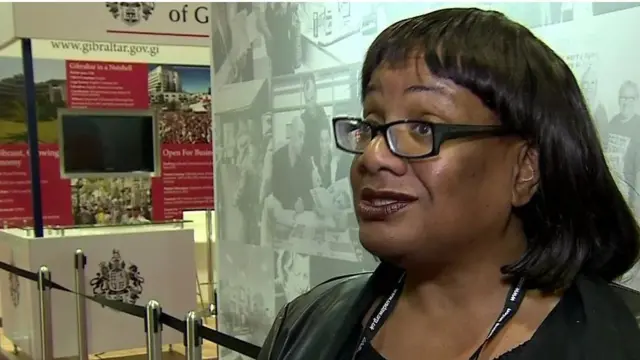
"The idea we can be self-sufficient in medical staff is ridiculous," said shadow health secretary Diane Abbott, after Jeremy Hunt pledged that the NHS will be in that position in a few years' time.
She added: "Training more doctors and nurses here is a good idea, but it will need additional money and the Tories are cutting £22bn from the NHS budget."
Theresa May tells the BBC's Laura Kuenssberg that the IMF has "upgraded the forecast for growth for the UK economy for this year".
"I think they've said that actually the response to the Brexit vote was more orderly than people had expected that it was going to be," she adds.
The prime minister adds that "the IMF and others have said that they are forecasting a slowdown in the economy next year" and the chancellor will "set out a trajectory for the government's response" to Brexit and the economic situation in his Autumn Statement in November.
Quote MessageBut what matters in terms of Brexit is that we're clear about the deal we want to get for the British people. That's the right deal. It's a deal that ensures that British businesses have the maximum opportunity to trade with and operate within the European Union."
BBC political editor tweets...
Allow X content?
This article contains content provided by X. We ask for your permission before anything is loaded, as they may be using cookies and other technologies. You may want to read X’s cookie policy, external and privacy policy, external before accepting. To view this content choose ‘accept and continue’.
Allow X content?
This article contains content provided by X. We ask for your permission before anything is loaded, as they may be using cookies and other technologies. You may want to read X’s cookie policy, external and privacy policy, external before accepting. To view this content choose ‘accept and continue’.
As day three of the Conservative conference draws for a close - and the pounds sinks to a 30-year low - Prime Minister Theresa May sat down for an interview with BBC political editor Laura Kuenssberg.
Mrs May says the process of leaving the EU is going to be complex but adds: "I think we should always remember that the fundamentals of the UK economy are strong.
Quote MessageWe have the fifth largest economy in the world and employment is at a record high and we are one of the fastest growing economies over recent years, but as we look ahead to the sort of deal that we are going to have with the European Union, I’m clear that we want the best deal for British business and for people here in the UK."
Is Mrs May worried about the falling pound?
"Currencies of course go up and down," the PM says, again insisting that "the fundamentals of our economy... are strong".
The UK economy remains "fundamentally strong" despite concerns about the impact of Brexit, Prime Minister Theresa May has said.In an interview with BBC political editor Laura Kuenssberg at the Conservative conference in Birmingham, Mrs May said Brexit talks would "not be plain sailing" but the UK was the fifth largest economy in the world.She also stood by her decision not to hold an early general election, saying the Conservatives were elected in 2015 and her government was "continuing the work that (predecessor) David Cameron started".She also said another general election would lead to "instability".
Sean Coughlan
Education correspondent
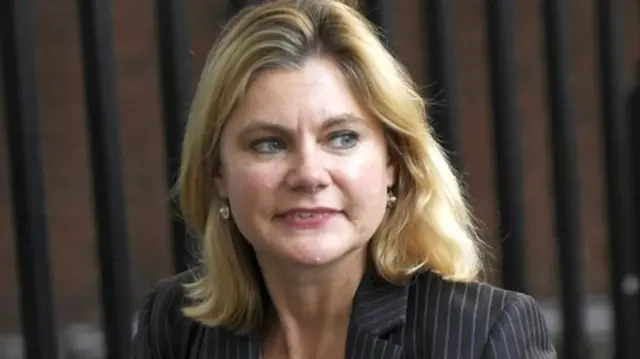 Image source, Reuters
Image source, ReutersEducation Secretary Justine Greening has announced six "opportunity areas" in England where social mobility will be promoted through improving schools and better links with employers.
The first areas will be Blackpool, Derby, Norwich, Oldham, Scarborough and West Somerset.
Ms Greening, speaking to the Conservative Party conference, said her plans to tackle social mobility "cold spots" would give pupils "the best start in life, no matter what their background".
After the initial six opportunity areas, there will be a further four to be announced at a later stage, with the 10 areas sharing funding of £60m.
The Liberal Democrats have claimed the government's plans to restrict overseas student numbers would damage universities.
Universities spokeswoman Baroness Burt said: "Cutting down on international student numbers would rob our economy of millions of pounds and do untold damage to our world-beating universities."
She argued that the loss of "vital income" from international students could deal universities "a double blow" when coupled with a loss of EU funding post-Brexit, adding:
Quote MessageThe Conservative government must abandon this short-sighted policy and stop counting foreign students in its arbitrary immigration target."
"Following the EU referendum, we need an approach to migration that both supports the economy and deals with public concerns," says Josh Hardie, CBI deputy director general, in response to Amber Rudd's speech earlier.
He welcomes the home secretary's announcement of more funding to address migration pressures but said: “It is also time to be clear about the value of migration to the UK, as well as its challenges".
"Businesses will not welcome further restrictions on high skilled migration from key trading partners around the world, especially as a series of changes were only announced earlier this year.
"At a time when we need strong links globally to seize new opportunities after the referendum, being seen as open to the best and brightest is vital. And we should be clear that business does not see immigration and training as an either/or choice. We need both."
Quote MessageThe government must tread carefully on any changes to student immigration to make sure we don't undermine this critical sector for national prosperity."
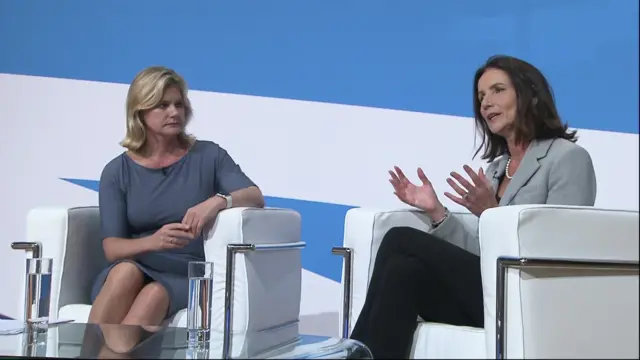
CBI director general Carolyn Fairbairn joins Education Secretary Justine Greening, who says business can mentor children and "set sights high" for them.
Education Secretary Justine Greening says there will be six "opportunity areas" to trial "our new approach" to education.
Business, she says, will work in partnership with "local councils and local communities".
She finishes her speech by saying the Conservatives are "going to level up Britain".
Justine Greening says education is a "postcode lottery" at present, "unless you can afford to move to the right area".
She argues that grammar schools have "a track record of closing the attainment gap" and says the government would enable areas that want to open more grammar schools to do so.
The government would also be "flexible about the age" that pupils would attend grammar schools, she adds, insisting: "This is not about a return of the 11-plus."
On further and higher education, Ms Greening says she wants to "put the quality of our technical education on a par with our academic education".
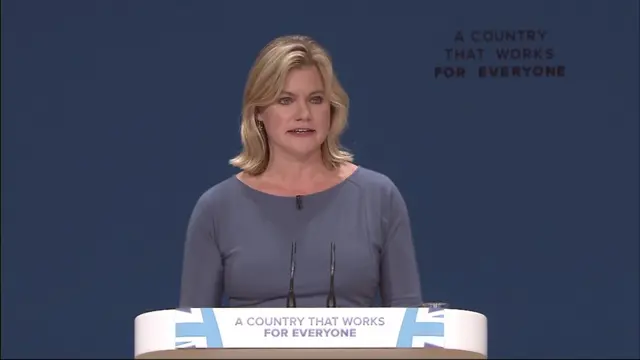
Education Secretary Justine Greening says "education is at the heart of our ambition" to create "a true meritocracy".
She says as a child growing up in Rotherham, "all I wanted was a level playing field", above all in education.
She says she is "the first comprehensive school educated secretary of state for education".
Jeremy Hunt says overseas doctors "do a fantastic job and the NHS would fall over without them".
However, he argues it cannot be right to be "importing doctors from poorer countries that need them" while turning away people in the UK who want to train.
The government's plan to increase the number of medical school places in England by 25% from 2018 is "the biggest annual increase in medical school training in the history of the NHS", the health secretary says.
He acknowledges that it will take some years before the new doctors qualify but plegdes the NHS will become "self-sufficient" in doctors.
Training a doctor costs more than £200,000, Mr Hunt says, and asking doctors to work in the NHS for four years after training is similar to a requirement that the Army places on recruits after their training.
The health secretary claims there are 150 preventable deaths in hospitals every week, "according to independent research".
Jeremy Hunt also lists non-fatal medical mistakes, saying "other countries have the same issues" but they should not be accepted anywhere.
He also claims that research points to "the weekend effect" with "mortality rates up to 50% higher" in hospitals at the weekend.
Mr Hunt, who has been embroiled in a long-running dispute with junior doctors over new rotas, welcomes the BMA calling off recently scheduled strikes but adds: "I say to the BMA and all junior doctors: let's not argue about statistics."
Quote MessageCall of the strikes and start working with us to deliver safer care seven days a week."
The home secretary says tighter immigration rules for foreign workers and students can change public opinion on immigration.
Read MoreA European human rights watchdog says xenophobia in the UK has been stoked by "considerable intolerant political discourse".
Read MoreJeremy Hunt praises the NHS but adds: "We don't always get things right."
He says James Titcombe, who spoke before him, had to send "300 letters and 3,000 emails" to find out what happened to his late baby son.
Instead of supporting him, the system pulled up the drawbridge", Mr Hunt says, adding that "closing ranks" against such inquiries is not acceptable.
The health secretary also says Melissa Mead's work "will save the lives of thousands of new babies".
The government has introduced a "duty of candour" for the health service and "Ofsted-style ratings", he adds.
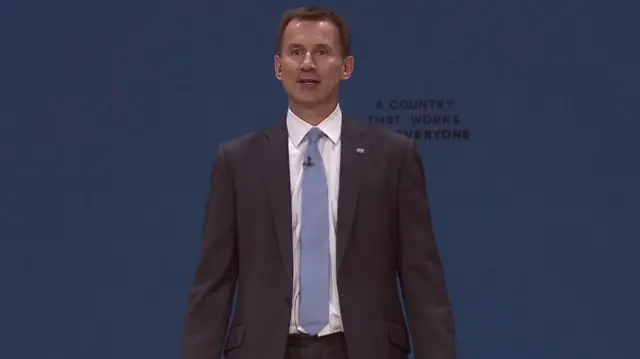
"I believe totally and utterly in our NHS," says Jeremy Hunt in his speech to party conference.
He jokes that his job as health secretary could be "the safest, because there's not a long line of other ministers who want it" - but he adds that he is proud to be responsible for "our most precious public service".